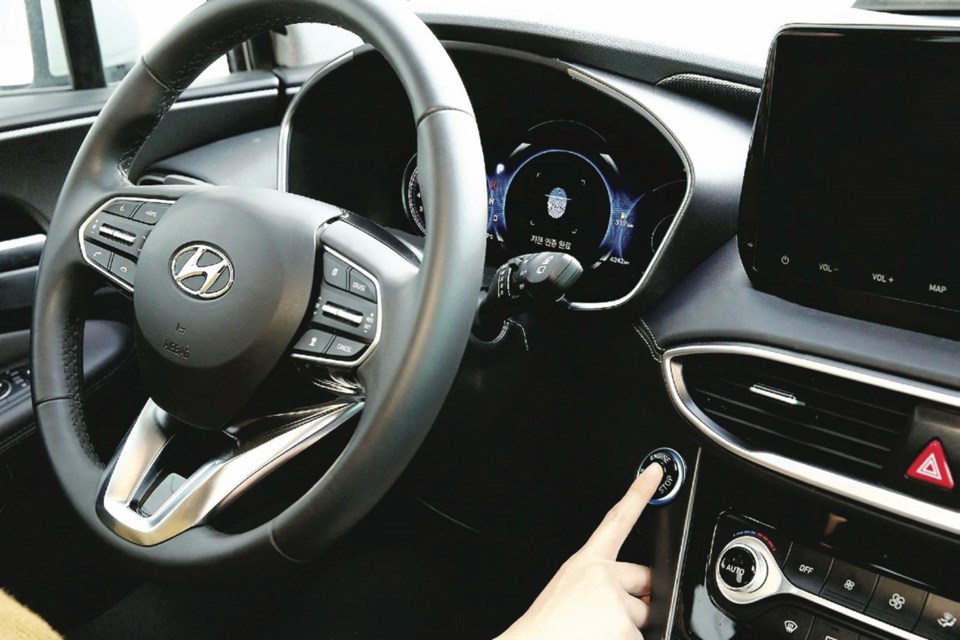The 2019 Hyundai Santa Fe tall wagon will be the company’s first model to offer fingertip technology for unlocking and starting the vehicle, without a key or a key fob.
Placing a finger over a sensor in the door handle gets the authorized driver inside. Placing a finger over a sensor on the dash then starts the vehicle.
Hyundai said the tech also provides a customized driving environment; the vehicle automatically adjusts seating positions, connected-car features and side-view mirror angles.
And there’s more: plans are to expand fingerprint reading to adjust temperature, steering wheel and other features tailored to driver’s preferences. Hyundai said its sensors are fine-tuned enough to read the electricity levels in various parts of the fingertip to prevent forgeries and fakes.
Queen names racing designer-engineer as Commander of the British Empire
A lifetime of design and engineering innovation, first in Formula One racing and now as a manufacturer of next-generation urban automobiles, has earned Gordon Murray the title Commander of the British Empire for “services to Motoring” in the Queen’s New Year’s Honours, and for devising and delivering “creative and groundbreaking projects” in the motorsport and automotive sectors.
McLaren cars have won dozens of Formula One races and its sportscar business has flourished with vehicles such as the P1.
Murray has since shifted his focus to urban mobility and iStream, an innovative and disruptive automobile-manufacturing technology that uses carbon fibre.
Daimler designs batteries essential to an electric future
If you think the switch to electricity is a fad or pie-in-the-sky for auto manufacturers, consider this: Daimler said Dec. 28 it will spend more than US $23 billion on battery-cell production by 2030.
It will spend an additional $11 billion to expand production of its wide-ranging Mercedes-Benz electric fleet and has begun building the first of two initial battery plants in Germany.
It said in a statement that four plants are earmarked for Germany. Abroad, a plant will be constructed in Tuscaloosa, Alabama, and another in Beijing, China.
“We are now taking the next step,” said Chairman Dieter Zetsche. Most automakers have earmarked multiple billions of dollars to developing next-generation mobility.
Braking technology ‘prints’ lightweight calipers
A new type of brake caliper, 3-D printed using titanium, has been designed by supercar builder Bugatti.
The Chiron supercar features the elaborate and certainly pricey stopping components on its front axle. Each takes 45 hours to build as the calipers are constructed of titanium powder layered more than 2,000 times before baking the final product into super hardness.
Titanium’s properties include being as strong as steel with far less mass, and it can withstand extreme temperature swings.
The caliper weighs three kilograms. Bugatti says the caliper is about 40-per-cent lighter than conventional designs and is also stronger. In testing, the caliper survived many abuses and temperatures close to 1,100 C.
EV customers get double exposure
Competing electric-vehicle chargepoint providers Greenlots and ChargePoint have forged a “roaming partnership” to enable customers of one service to use the other’s, anywhere, and at no extra cost.
Mobile apps available from each company can be used to locate charging stations operated by both brands, activate charging sessions and pay for charging.
The fragmented industry “is building momentum toward true driver interoperability” and the adoption of standards that favour drivers, automakers, grid operators and charging infrastructure providers,” said Greenlots senior vice-president Lin-Zhuang Khoo.
It’s a sign, she said, the EV charging market is “maturing in concert with surging customer demand for EVs.” Khoo invited other networks “to join us in similar partnerships as we seek to make EV charging ubiquitous.”
Shift points
• To better protect its legacy of classic sports cars still being driven, Porsche has launched its own vehicle security and tracking system designed just for those classic models. One of the features is “geo-fencing,” which notifies the owner if the car leaves a defined area.
• In Scottsdale, Arizona, an electric delivery pod operated by mobility company Nuro has successfully completed its first store-to-home grocery delivery for grocery giant Kroger. It joined Kroger’s fleet of 50 self-driving Prius cars that made 1,000-plus earlier delivers without requiring their “drivers” to intervene.
• Not only did Porsche sell out Year One production of its flagship electric Taycan sports car, said the company's North American President and CEO Klaus Zellmer, but most of those who put down (US) $2,500 deposits are current Tesla owners, reports alternative vehicles webmagazine, Green Car Reports. Klaus provided to further details.



